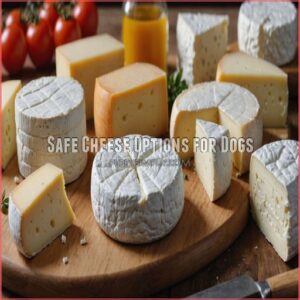This site is supported by our readers. We may earn a commission, at no cost to you, if you purchase through links.
 Sure, dogs can nibble on American cheese, but keep it in small doses.
Sure, dogs can nibble on American cheese, but keep it in small doses.
While it won’t poison them, it’s not the healthiest snack out there.
Cheese is packed with fat, and that can lead to a pudgy pup if you’re not careful.
Plus, some dogs are lactose intolerant, just like some people, so watch for any tummy troubles.
It’s like that time Uncle Joe devoured a wheel of Brie—unforgettable and slightly dramatic.
If you want to share cheese with your pooch, low-fat options are better.
And remember, if curious about other dog-safe cheeses, stay tuned for cheesy details!
Table Of Contents
- Key Takeaways
- Is American Cheese Safe
- American Cheese Ingredients
- Can Dogs Eat American Cheese
- Risks of American Cheese
- Tips for Mild Tummy Upset
- Monitoring and Veterinary Care
- Benefits of Cheese for Dogs
- Risks of Cheese for Dogs
- Safe Cheese Options for Dogs
- Feeding American Cheese Safely
- Frequently Asked Questions (FAQs)
- Can dogs eat cheese?
- How much cheese can one eat in a day?
- Are all cheeses healthy for dogs?
- Can a dog eat a cheese plate?
- Can dogs eat cream cheese?
- Can a low Fat Dog Eat Cheese?
- What happens if my dog eats American cheese?
- What kind of cheese can dogs eat?
- Can dogs have Kraft Singles cheese?
- How many slices of cheese can I give my dog?
- How much American cheese can dogs eat?
- Are puppies allowed to have American cheese?
- Does American cheese affect dog allergies?
- Can lactose-intolerant dogs eat American cheese?
- How often can dogs eat cheese treats?
- Conclusion
Key Takeaways
- Monitor your dog’s reaction when giving American cheese; some may have digestive issues or lactose intolerance.
- Keep portions small to avoid weight gain due to the high fat and sodium content in American cheese.
- Use American cheese as an occasional treat rather than a regular snack for your dog.
- Low-fat cheese varieties are a safer option if you want to share cheese with your dog.
Is American Cheese Safe
You’ll be relieved to know that American cheese doesn’t contain any toxic ingredients for your furry friend.
While larger dogs are less likely to have issues with this processed cheese product, you should still feed it in moderation and watch for any signs of digestive upset.
No Toxic Ingredients for Dogs
American cheese typically doesn’t contain any ingredients that are toxic to dogs.
While it’s processed, the main components – milk, whey, proteins, and emulsifiers – won’t harm your pup, and you can even find products specifically designed with american cheese dogs safe in mind through online retailers.
You’ll find these ingredients are generally safe, unlike blue cheese which contains harmful compounds.
However, moderation is key since American cheese is high in sodium and fat, making it better as an occasional treat than a regular snack.
Larger Dogs Less Likely to Experience Issues
Your big pup’s got an advantage in terms of handling American cheese.
Larger dogs typically have more robust digestive systems and can process small amounts of dairy better than their tiny counterparts.
Think of it like this: what might upset a Chihuahua’s tummy might barely register for a Great Dane.
Still, remember that size isn’t everything – every dog’s individual tolerance varies.
American Cheese Ingredients
You’ll find that American cheese isn’t exactly a natural cheese, but rather a processed product made with milk, whey, proteins, and emulsifying salts.
While these ingredients aren’t toxic to dogs, they can cause mild stomach upset in some pets, especially those sensitive to dairy products.
Processed Cheese Product
The ingredients in processed cheese products might surprise you.
Unlike natural cheese, these slices contain milk proteins, emulsifiers, preservatives, and food coloring.
Here’s what makes up those familiar orange squares:
- Milk protein concentrate or whey
- Salt and preservatives
- Added vitamins and minerals
- Artificial colors and flavors
While not technically "real cheese," these processed slices still provide some nutritional value through their protein and calcium content.
Potential Gastrointestinal Upset
While processed cheese can be a tasty treat, it mightn’t sit well with every pup’s stomach.
Dogs with sensitive stomachs may benefit from a customized diet with novel proteins like trout or salmon found in top-rated dog food. Dogs with lactose intolerance or food sensitivities could experience digestive issues after eating American cheese.
Watch for signs of stomach upset like mild diarrhea or vomiting.
Don’t worry too much though – these symptoms usually clear up quickly, but it’s worth knowing your dog’s tolerance level before making cheese a regular treat.
Can Dogs Eat American Cheese
You’ll be glad to know that American cheese rarely causes problems for most dogs when given as an occasional treat.
While it’s not the healthiest option, your furry friend can typically digest small amounts of American cheese without any issues.
Rarely Causes Problems
Most dogs handle American cheese without any issues, making it a popular training treat.
When given in moderation, this familiar dairy product rarely triggers adverse reactions in our furry friends.
- Small pieces work best for training sessions
- Fresh, unopened cheese reduces risk of spoilage
- Room temperature cheese is more appealing to dogs
- Low-fat varieties are gentler on sensitive stomachs
- Single-slice servings help control portions
Typically Passes Through Digestive Tract Without Incident
Your furry friend’s digestive system is remarkably efficient at processing American cheese.
Just like when they munch on their regular kibble, their body breaks down this dairy treat without much fuss.
Dogs’ stomachs typically handle American cheese well, converting it into energy and waste products that pass through naturally.
Remember though – every pup’s different, so watch how yours responds to this cheesy snack.
Risks of American Cheese
While you can give your dog American cheese as an occasional treat, you’ll need to watch for potential digestive issues like vomiting or diarrhea.
If your dog does experience stomach upset, you’ll be relieved to know that these symptoms typically resolve on their own without serious complications.
Vomiting or Diarrhea Possible in Some Dogs
Some dogs experience digestive issues after eating American cheese.
Like humans with food sensitivities, dogs can react with vomiting or diarrhea, especially smaller breeds.
Lactose intolerance plays a key role here – many dogs lack the enzymes needed to break down dairy properly, much like those who should avoid cream cheese due to its dairy allergen dangers.
If your pup shows signs of stomach upset after their cheesy treat, don’t panic.
Just keep an eye on their symptoms.
Transient and Usually Resolves on Its Own
While vomiting and diarrhea from American cheese might seem concerning, these symptoms typically clear up within 24-48 hours without intervention.
Dogs’ digestive systems are remarkably resilient, bouncing back naturally from mild food reactions.
Just like how we might feel queasy after too much junk food, your pup’s tummy upset will usually sort itself out with time and plenty of fresh water.
Not Typically Serious
Most dogs bounce back quickly from eating American cheese without major issues.
Here’s what typically happens when your pup sneaks a slice:
- Mild stomach upset lasting 12-24 hours
- Temporary decrease in appetite
- Occasional loose stools that resolve naturally
If your dog shows these symptoms, don’t panic. Keep an eye on them and make sure they’ve access to fresh water. The discomfort usually passes within a day.
Tips for Mild Tummy Upset
If your dog isn’t feeling well after eating American cheese, you’ve got several quick remedies that can help settle their stomach.
You can try giving them Pepcid to reduce symptoms.
You can also adjust their diet to give their digestive system a break.
Pepcid (famotidine) Can Help Reduce Symptoms
If your dog’s tummy troubles are barking louder than fireworks, Pepcid (famotidine) might just calm the storm.
This over-the-counter medication can soothe mild upsets.
Here’s a quick look:
| Dosage | Frequency | Effects | Alternatives | Side Effects |
|---|---|---|---|---|
| Small | Twice daily | Soothes | Probiotics | Rare |
| Medium | Twice daily | Calms | Diet changes | Minimal |
| Large | Twice daily | Relieves | Yogurt | Mild |
Remember, always consult your vet first!
Diet Modification Can Rest Intestinal Tract
Try tweaking your dog’s diet to soothe a touchy tummy, considering the importance of limited ingredient formulas for sensitive stomachs.
Switching to bland foods like boiled chicken and rice gives the gut a breather.
This simple diet modification can help manage digestive issues stemming from food sensitivities.
Just like a pit stop recharges a road trip, it can give your dog’s intestinal tract the rest it needs.
Live Yogurt Can Restore Gut Bacteria Balance
When your pup’s tummy’s on the fritz, consider live yogurt to balance their gut bacteria.
Packed with probiotics, which can include a variety of strains such as Lactobacillus and Bifidobacterium found in dog probiotic supplements, it can soothe digestive issues and support dog health.
For a healthy dose of probiotics, you can try adding products like dog yogurt supplements to their diet.
Just like humans need a little gut TLC sometimes, your furry friend can benefit too.
Choose plain, unflavored yogurt, and offer in moderation, ensuring it’s an ally in their digestive journey.
Monitoring and Veterinary Care
You should keep a close eye on your dog after they eat American cheese to catch any signs of distress early.
If your dog’s condition worsens or you notice significant changes, contact your vet promptly to guarantee their health and safety.
Observe Dog for Signs of Distress
After giving your dog a tiny taste of American cheese, keep a close eye on them, especially if they’ve a history of diarrhea in dogs that can be caused by various factors such as digestive problems, stress, parasites, infections, and irritable bowel syndrome.
Usually, nothing happens, but sometimes, dogs get a bit of an upset tummy.
Watch for vomiting or diarrhea—signs of a possible lactose intolerance reaction. Even mild diarrhea can be a sign of trouble. Keep an eye out for lethargy or loss of appetite, too. These aren’t always serious, but it’s best to be safe.
Contact Vet if Condition Worsens
If your pup’s not bouncing back or keeps showing worrying signs—it’s time for a chat with the vet.
Here’s a checklist to help you decide:
- Changes in appetite or excessive vomiting
- Diarrhea lasting more than a day
- Lethargy or unusual behavior
Your dog’s comfort and safety are top priorities, so don’t hesitate to reach out.
Seek Veterinary Attention Promptly if Significant Deterioration Occurs
You’ve noticed your dog’s health turning South? It’s time to act fast.
Prompt vet attention is key if significant deterioration occurs.
Dogs can’t tell us they’re in distress, especially when struggling with conditions like kidney failure, which can lead to symptoms such as increased thirst and urination understanding kidney failure. It’s up to us to know when to rush for that golden vet advice.
| Symptom | What it Could Mean | Action |
|---|---|---|
| Lethargy | Serious reaction | Urgent care |
| Ongoing Vomiting | Dog health concern | Emergency vet visit |
| Seizures | Critical condition | Immediate vet attention |
Benefits of Cheese for Dogs
When you give your dog cheese, you’re offering more than just a tasty treat.
Cheese is packed with protein, calcium, vitamin A, essential fatty acids, and B-complex vitamins that support your dog’s overall health.
Contains Protein
Cheese, like a trusty sidekick in your dog’s diet, provides valuable protein to support muscle growth and repair.
Here’s why it’s beneficial:
- Protein Content: Dogs need protein for energy and strength.
- Dietary Needs: Cheese fits well in balanced diets.
- Dog Nutrition: Protein is essential for overall health.
- Cheese Benefits: Offers a tasty protein source.
Contains Calcium
Sure, cheese isn’t just about protein; it’s also rich in calcium, essential for bone health.
Think of it as a little boost for your dog’s skeleton.
While calcium in dog food helps, adding a bit from cheese can fill the gap.
Remember, moderation’s key to preventing calcium deficiency without turning your pup into a cheese connoisseur.
Contains Vitamin A
Think your dog’s favorite treat is just about taste?
It’s also packing Vitamin A, which plays a big role in supporting dog vision and overall eye health.
Much like a knight needs armor, your pup needs this nutrient to keep those eyes sharp.
Besides cheese, puppies can also find Vitamin A benefits in carrots and sweet potatoes—a feast for their eyes!
Contains Essential Fatty Acids
Vitamin A is great for your dog’s vision, but did you know cheese also packs a punch of essential fatty acids?
These aren’t just for shiny fur!
They’re key for your pup’s overall health.
- Improved skin and coat
- Stronger joints
- Better brain function
- A healthier immune system
These Omega-3 benefits contribute to a happier, healthier dog. It’s a win-win!
Contains B-complex Vitamins
Cheese packs a punch with B-complex vitamins, boosting your dog’s health in surprising ways.
These nutrients support brain function, energy levels, and overall well-being.
Sneak a cheese treat now and then into their diet, but remember moderation’s key!
Keep an eye on your dog’s reaction, and opt for low-fat varieties to balance the nutritional value with safety.
Risks of Cheese for Dogs
American cheese might be tempting, but it poses certain risks for your dog due to its high fat content.
Feeding too much can lead to weight gain, obesity, and even pancreatitis, so it’s important to be cautious.
High in Fat
While cheese offers benefits, its high fat content is a concern.
Here are some potential risks to keep in mind:
- Dietary fat can lead to pancreatitis.
- High-fat diets increase obesity risk.
- Consuming excessive fat can cause digestive issues.
- A diet high in fat may lead to unhealthy weight gain.
Be mindful of these risks when sharing cheese with your dog.
Can Cause Weight Gain
Adding cheese to your dog’s diet isn’t always a walk in the park.
It’s high in fat, which can sneakily add up and cause weight gain if you’re not careful.
Imagine cheese as a minor indulgence rather than a frequent flyer in your dog’s bowl.
| Factor | Alert | Advice |
|---|---|---|
| Dog food | High fat | Opt for balanced meals |
| Exercise | Important | Increase activity levels |
| Portion control | Essential | Limit cheese servings |
Can Lead to Obesity
Overindulging in cheese, with its high calorie content, can make your furry friend tip the scales towards obesity.
Here’s how to keep it in check:
- Monitor Portions: Seriously, watch those cheese bits!
- Exercise Regularly: A game of fetch does wonders.
- Choose Wisely: Opt for low-fat cheese for a healthier bite.
Can Lead to Pancreatitis
High-fat cheese, like a delicious but risky treat, can pack a punch.
Too much fat isn’t just about weight gain; it also contributes to other health concerns, such as the high sugar content in ice cream leading to digestive issues in dogs; it increases your dog’s risk of pancreatitis.
This inflammation of the pancreas is serious.
Pancreatitis symptoms include vomiting, diarrhea, and lethargy.
If you notice these signs after a cheesy snack, see your vet.
Remember, moderation is key in your dog’s diet.
A balanced diet supports their overall health.
Safe Cheese Options for Dogs
When choosing cheese for your dog, opt for varieties like mozzarella, cottage cheese, or soft goat cheese, which are lower in fat and sodium.
These options are generally safer and help guarantee your furry friend enjoys a tasty treat without the health risks associated with richer cheeses.
Mozzarella
If you’re considering mozzarella for your pup, you’re in luck!
This cheese is lower in fat and sodium, making it a safer snack.
Mozzarella benefits include high protein and less lactose, which means fewer tummy troubles compared to cheddar.
Much like cottage cheese, with its benefits of probiotics for gut health, mozzarella can be a great addition to your dog’s diet in moderation.
It’s great for training sessions too—small bites make effective rewards while keeping calorie intake in check.
Cottage Cheese
Switching gears from mozzarella, let’s talk cottage cheese.
Dogs can enjoy it too, thanks to its low fat and sodium, making it a solid choice for a safe snack.
Plus, it’s packed with protein and calcium which help keep them strong.
Just remember to keep in mind their lactose tolerance, as too much might lead to digestive discomfort.
Soft Goat Cheese
Soft goat cheese can be a treat that’s gentle on your dog’s tummy.
While it has less lactose than traditional options, be cautious of goat cheese allergies.
Its nutritional value includes calcium and protein, making it appealing for puppies.
In the battle of goat cheese vs. cheddar, goat cheese often wins for being easier to digest.
Low in Fat
Speaking of delicious cheese alternatives for your furry friend, consider those low in fat.
These types help with weight management, much like picking a salad over fries.
Think of low-fat brands as guilt-free treats for your dog.
They get the cheesy goodness without packing on unnecessary pounds, making them a healthier choice in moderation.
Low in Sodium
Did you know your furry friend can enjoy some cheese too?
Low in sodium varieties, like mozzarella and cottage cheese, are gentle on their bodies.
A low sodium diet helps dogs avoid dehydration and kidney issues.
So, sprinkle a bit into their meals as a treat.
These sodium-free alternatives keep your pup’s tail wagging without the worries!
Feeding American Cheese Safely
Want to share American cheese with your furry friend? Remember, moderation is key, and always watch for any tummy troubles after they’ve had a taste.
Moderation is Key
Choosing the right cheese for your dog can make a difference!
Moderation helps avoid common health concerns.
Keep an eye on cheese portions: too much of a good thing mightn’t be great.
Consider your dog’s size and treat frequency to prevent issues.
Look for lower-fat cheese varieties to keep snack time safe and enjoyable for your furry friend.
Monitor Your Dog’s Reaction
Every dog’s gut is unique.
When giving American cheese, keep an eye on your dog’s reaction.
If you suspect lactose intolerance, consider performing a dog lactose intolerance test.
Look for signs of lactose intolerance like digestive upset or allergic reactions.
Some dogs may experience weight gain.
Start with a tiny piece and watch out for individual tolerance.
If your dog seems happy and healthy, you’re likely in the clear.
Choose Low-Fat Varieties
After checking your dog’s reaction to cheese, consider their age and potential for joint issues.
Low-fat diets can help manage joint health, improve digestion, and support overall well-being in senior dogs, especially when following a diet plan like low fat diets for older dogs.
Their reduced fat content can help with weight management and prevent pancreatitis.
Popular low-fat cheese brands offer alternatives with benefits, like fewer calories and a positive impact on your dog’s diet.
Consider these options for a healthier treat.
Balancing treats with nutrition keeps your pup in great shape.
Frequently Asked Questions (FAQs)
Can dogs eat cheese?
Dogs can eat some cheeses like cheddar, mozzarella, and cottage, but avoid soft and blue cheeses due to health risks.
Cheeses like cheddar, mozzarella, and cottage are generally safe for dogs to eat in moderation.
However, soft and blue cheeses can be dangerous for dogs.
Keep portions small since too much cheese can lead to weight gain and digestive issues.
How much cheese can one eat in a day?
There’s no magic number!
It depends on your overall diet and health goals.
Moderation is key; too much cheese can pack on the pounds and cause digestive upset.
Listen to your body!
Are all cheeses healthy for dogs?
Ever wondered if your dog can eat cheddar or mozzarella?
Not all cheeses are dog-friendly.
Some, like blue cheese, can cause health issues.
Stick to low-fat options like cottage cheese for safe indulgence.
Always watch your pup’s reaction.
Can a dog eat a cheese plate?
You might think a cheese plate is a tasty treat for your dog, but it’s not ideal.
Soft cheeses like brie and blue cheeses can be harmful.
Stick to safer options like mozzarella, cheddar, and cottage cheese.
Can dogs eat cream cheese?
Like giving a dog a gentle hug, cream cheese in moderation is generally safe for them.
Opt for low-fat versions, though, as it’s high in fat and can upset their tummy if overindulged.
Can a low Fat Dog Eat Cheese?
A low-fat dog can enjoy cheese in moderation.
Opt for varieties like mozzarella or cottage cheese, which are low in fat and sodium.
Always monitor your dog’s reaction to cheese and consult a vet if necessary.
What happens if my dog eats American cheese?
Imagine your dog devours American cheese like it’s candy.
In small amounts, it’s usually safe but high in fat and sodium.
Too much might upset their stomach, cause weight gain, or lead to digestive issues.
What kind of cheese can dogs eat?
Dogs can safely enjoy mozzarella, cottage cheese, and cheddar in small amounts.
These cheeses are low in fat and sodium, making them good treats.
Avoid brie, blue, and goat cheese due to high fat and toxin risks.
Can dogs have Kraft Singles cheese?
Kraft Singles aren’t ideal for your pup.
They’re high in salt and fat.
A little bit won’t kill them, but it’s best to stick to safer cheese choices.
Think cheddar or mozzarella in small amounts.
How many slices of cheese can I give my dog?
Limit cheese to occasional treats and in small amounts—about a half slice for small dogs, or one to two slices for larger breeds that can also benefit from daily dental chews, to help maintain their overall oral health.
Monitor for any lactose intolerance signs, like diarrhea or vomiting, after eating.
How much American cheese can dogs eat?
American cheese should be given sparingly—think of it as a rare treat, not a daily snack.
Its high sodium and fat content can lead to health issues, so just a small piece once in a while is best.
Are puppies allowed to have American cheese?
Yes, puppies can enjoy a little American cheese as a special treat, but watch out for lactose intolerance.
Keep portions small to avoid upset tummies, and make sure cheese doesn’t replace their balanced puppy diet.
Does American cheese affect dog allergies?
If your dog’s allergic to dairy, American cheese might trigger reactions like itching or digestive upset.
Try a small amount first and monitor closely.
Consult your vet for personalized advice, especially if allergies are already a concern.
Can lactose-intolerant dogs eat American cheese?
Every dog has its bone, but lactose-intolerant ones should steer clear of American cheese.
Its lactose content can trigger digestive issues like diarrhea and bloating.
Opt for lactose-free alternatives to keep your furry friend comfortable.
How often can dogs eat cheese treats?
You can treat your dog to cheese a few times a week, but keep portions small.
Watch for any tummy troubles and go for low-fat options.
Remember, moderation is key to avoid weight gain and digestive issues.
Conclusion
Ultimately, can dogs eat American cheese? Yes, but sparingly.
Remember, moderation matters most.
While a tiny taste won’t harm your furry friend, too much can upset their tummy.
Always monitor your dog after treating them to American cheese, watching for any digestive distress.
If you notice vomiting or diarrhea, consult your vet.
Choose low-fat options if you must share your cheese.
Safe snacking promotes a happy, healthy pup!


















